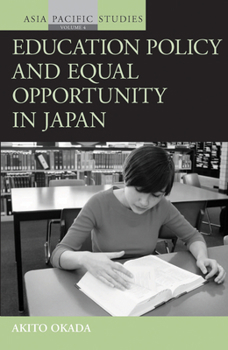Education Policy and Equal Opportunity in Japan
(Book #4 in the Asia-Pacific Studies: Past and Present Series)
In many societies today, educational aims or goals are commonly characterized in terms of "equality," "equal opportunity," "equal access" or "equal rights," the underlying assumption being that "equality" in some form is an intelligible and sensible educational ideal. Yet, there are different views and lively debates about what sort of equality should be pursued; in particular, the issue of equality of educational opportunity has served as justification for much of the postwar restructuring of educational systems around the world. The author explores different interpretations of the concept of equality of educational opportunity in Japan, especially as applied to post-World War II educational policies. By focusing on the positions taken by key actors such as the major political parties, central administrative bodies, teachers' unions, and scholars, he describes how their concepts have developed over time and in what way they relate to the making of educational policy, especially in light of Japan's falling birthrate and aging society.
Format:Hardcover
Language:English
ISBN:0857452673
ISBN13:9780857452672
Release Date:December 2011
Publisher:Berghahn Books
Length:218 Pages
Weight:1.00 lbs.
Dimensions:0.5" x 6.0" x 9.0"
Customer Reviews
0 rating





